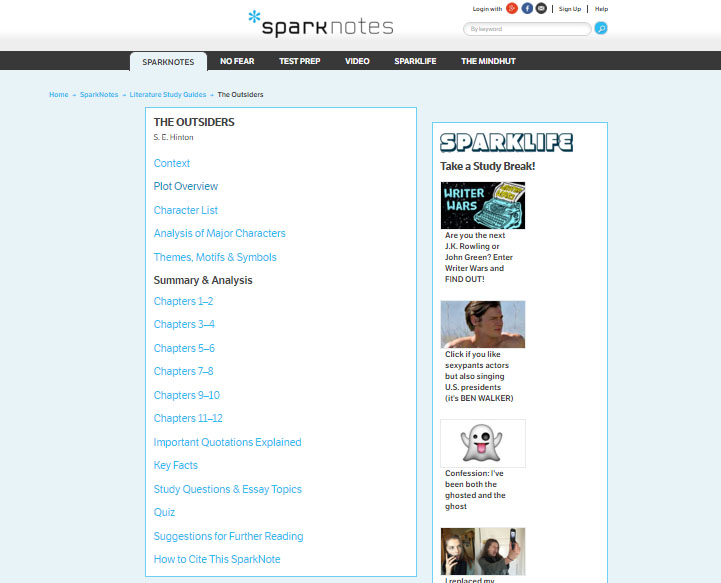Literature Aid is a Click Away
This is a photo of a SparkNotes summary of the book “The Outsiders” by S.E. Hinton.
“When Johnny dies, Dally loses control and runs from the room in a frenzy.”
This is an excerpt from the summary of “The Outsiders” provided on Sparknotes.com.
In the book, and not the summary, Johnny dying and Dally getting upset is a key point in the classic that every BMS eighth grader reads, and the moment leaves the reader confused about what’s going on and how the characters got to this point. This moment takes at least a page to occur in the story, but in the summary it takes a sentence. Not only that, but by reading the summary, the reader doesn’t understand how important this moment really is.
When a book club in LA begins, the book is either an assigned novel such as “The Outsiders” or a selection of books in a “book club.” Students often prefer to choose their book from a varied list, and when the novel is assigned, some students struggle with level and comprehending the themes or plot. When it comes times to write about what they’re reading, these students will have a tough time finding things to write about.
Sparknotes, Shmoop and Wikipedia are websites most commonly used when people do not finish their book for LA or social studies. It provides summaries of books that are commonly read in schools and their chapters. Not only does this add Sparknotes to the long list of possible cheating aids that have come to be used on the Internet, but it begs the question: Is there a way to use this potential cheating aid in a harmless way?
On an “Ursus “ survey, 66 percent of survey takers said that using the website isn’t cheating, but most agreed that by using the website, they’re not getting enough understanding of the topic, so when test time comes, they’re only hurting themselves. But is that the only price you’ll pay?
Shmoop, another website similar to Sparknotes, makes its money not only through advertising, but also provides the options of subscribing to their website. Shmoop advertises “300 core courses, electives and credit recovery solutions for middle school and high school,” which they offer for $24.68 a month.
Subscribing also rids your screen of video advertisements. Both sites aim to provide assistance in school, and as Sparknotes describes it, “Our hope is that our analyses will help you draw your own conclusions about the work, and craft a unique opinion for tests and papers.” It boils down to how exactly students use these websites, and whether they are using them responsibly or not. And that depends entirely on the students.
“If you’re reading a book that’s too hard for you, you should talk to your teacher about it, instead of using those websites,” said Katie, an eighth grader. “Then you can read a different book and understand everything, instead of getting information from the websites that you don’t understand.”
This is just the definition of good overall advice: the best way to learn something is to understand it.
Mrs. Keri Jockers, a sixth grade language arts teacher, said that using these websites defeats the purpose of reading the book, and if students use them instead of reading the book, they’re not putting in the hard work.
“If a student is struggling with a book I urge them to tell me early on,” said Mrs. Jockers. She says that websites like Sparknotes and Shmoop could be used responsibly as “a fix-up strategy” for students if they forget what happened in the book after they’ve read it or as a way to sample the book to make sure that they’ll enjoy reading it.
These websites can be just as helpful as they can be harmful. And really, it just boils down to the way a student uses them.
So if you’re having difficulties finishing your book, or if you feel like it’s too difficult for you, it’s probably best to talk to your language arts teacher about it. And if you finish the book and you’re still confused about what happened, use Sparknotes and Shmoop responsibly.



